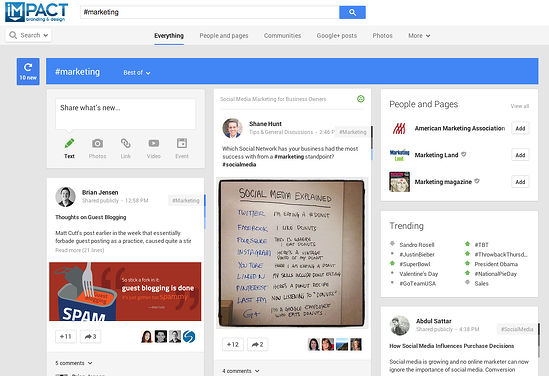Subscribe now and get the latest podcast releases delivered straight to your inbox.
 Social media is undoubtedly changing the way Internet users discover new information.
Social media is undoubtedly changing the way Internet users discover new information.
While social networks are becoming a valuable avenue for traffic, businesses must recognize that this type of change requires new approaches for optimization.
Content is becoming increasingly more socialized with each passing day, which is why it is critical that businesses begin thinking about how they will adjust their marketing strategies accordingly.
As the landscape shifts from traditional search engine optimization to an intersection between social and search, businesses are left wondering how to make their next move.
In an attempt to help your business to rise above the competition, we've highlighted the way in which social search is changing the game, and what you can do to welcome the change.
How to Increase Visibility for Social Search
Focus on Increasing Likes, Shares, Comments, Etc.
According to Nielsen Research, 92% of consumers worldwide trust recommendations from friends and family more than any form of advertising (this is up from 74% in 2007). So what if you could leverage your recommendations to achieve a greater search engine rank? Sounds like the best of both worlds, right?
Well, times are a-changin, and face-to-face recommendations from friends and family have carried over to an online setting where they now serve as a currency for search engine rank.
When a user likes or shares your social media content, it can be looked at as a personal endorsement. Essentially, in doing so they are willingly expressing their interest and support for you product or service for others to see.
With the introduction of Facebook's Graph Search, Facebook allows users to search for things like "shows that my friends like", and received tailored search results based off of shows that rank high in terms of the number of likes they have received from your friends:

If I conducted a search like this in a traditional search engine, It's likely that I would drum up a list of blue links to shows that I may or may not be interested in. What sets social search apart is that it pulls results based off my connectivity to them, increasing the odds that they will be of interest to me. The names of my friends who like the shows are displayed up front, making it easy for me to acknowledge their recommendation, and base my decision off of their endorsements.
Side note - Entourage? Boy Meets World? Excellent taste my friends, excellent taste.
Optimize Your Profile Description
While I am sure that many of you already have social media profiles in place, now is a better time than ever to revisit them and consider how they can be improved. After all, if you created your profile 5 or so years ago, it's likely that your profile content is a little stale by now.
When coming up with the content to filter into the different fields of your social profile, consider your use of keywords. You'll want to include words that relate to your product or service, for example a brand like Dial might use words like hand soap or antibacterial bar soap to help improve their visibility.
Lucky for us marketers, there are still tools in place to help guide keyword decisions. For example, Google Trends makes it easy for marketers to input potential keywords and compare and contrast their resonance against other words in a line graph format.
Be sure that you are filling out your profile to its full potential. A well-defined profile will perform better on search engine results pages, as there is a greater opportunity that your content will match the users search query.
Don't forget to include a link back to your website! If people are going to find your profile via social search, you want to take this opportunity to transition them from your social profile to your business' website where they can be converted.
Don't Forget About Hashtags
Hashtags serve a very important purpose on social platforms, so don't let that hashtag abusing friend you follow on Instagram discredit their importance.
Simply put, hashtags are categorization tools employed by social search engines to organize relative content.
While Twitter made these little pound signs famous, they have now found another home on platforms like Facebook, Google+, and Instragram.
In order to improve your social searchability, we suggest that you seek out popular hashtags within your industry and begin peppering them into your content. After all, tweets with hashtags receive 2x more engagement, however, 1-2 will get you 21% more engagement than 3, so don't go overboard.
As users begin to deliberately search for information and answers within the networks in which they are frequently engaging in, something as simple as hashtags will help you to increase your visibility.
Within the Google+ network, users can conduct a search for the hashtag #marketing and turn up results that look like this:

The social search engine results reveal only content that is connected to that particular hashtag. Hashtags will increase your content's visibility, which in turn has the potential to increase the +1's you receive. The more +1's your content holds, the better it will perform in search results, sounds like a promising series of events if you ask us.


Order Your Copy of Marcus Sheridan's New Book — Endless Customers!

